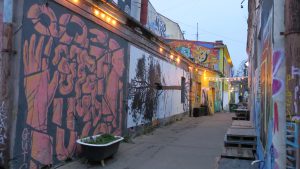Join JPI UE
Faq
FAQ
Please click here for the frequently asked questions we collected.
If you have an additional questions you are welcome to mail us at info@jpi-urbaneurope.eu
This year’s AGORA Thematic Dialogue was dedicated to issues and dilemmas in public spaces. 40 participants from over 20 countries participated in this workshop. The outcomes show that interventions for inclusive public spaces demand for comprehensive approaches to address the dilemmas and tap upon synergetic potentials. The results of the workshop will feed into the development of JPI Urban Europe’s 2020 joint call on Urban Transformation Capacities, additionally, a policy brief on the topic will be developed by a task force which formed around the workshop. Join Johannes Riegler, Stakeholder Involvement Officer in JPI Urban Europe, as he takes you on a journey through both the city of Riga and the workshops…

Wednesday, 20 November, 15:40: clear skies, chilly air: the participants of the workshop meet for the first time and are about to board a coach to go on a field visit to learn more about local actions on reclaiming and repurposing empty spaces in Riga. The tour is guided by the activists of Free Riga, an NGO aiming at activating unused spaces. The first stop is Tallinas Ielas Kvartals a former ambulance garage north of the Riga city center which has been transformed into a cultural centre. I remember that I had the pleasure to visit this place before: in May 2015, the URBACT city festival which took place in Riga organized a number of site visits. I attended the one on temporary use which was partly led by Free Riga. At that time, the area was not yet developed. We visited empty garages and got the information that this space has potential, that some actions are planned here and that we should come back at a later stage. So I was pleasantly surprised to be offered the opportunity to see the place four years later, completely transformed into a cultural centre with a new identity and use. We also visited a more recent project right in the heart of the city centre of Riga. The day ended with a joint dinner in downtown Riga kindly organized by our Latvian hosts.
Energized by the site visit on the day before, the workshop participants met at 9am sharp at the Latvian Ministry for Education and Science. It seemed liked people enjoyed the site visit and dinner on the day before, made connections among them already, exchanged viewpoints, experiences and felt comfortable to dive into the discussions on the substance matter right away.
The participants were asked to hand in a brief position paper on their expertise and view upon the dilemmas of public space. Out came a wonderfully rich booklet of almost 60 pages with a lot of detailed insights. You can download the booklet here.
We kicked off the workshop by splitting up the participants into groups to discuss concrete cases of public spaces. Therefore, we handed out five cases which addressed different issues/challenges/characteristics around public spaces: tourism, social problems, zero energy neighbourhoods and placemaking. The participants were asked to highlight the three most pressing dilemmas which they identified in the discussions from which the organizing team could derive 11 for further discussions on the next sessions. The most pressing dilemmas identified in the session were….
| How to create high quality public spaces ready for climate change? |
| How to enhance quality of public space while ensuring inclusiveness and accessibility? |
| How to balance local interests and global capital logics? |
| How to be attractive for tourists and cater for the needs of inhabitants? |
| How to create safe and open spaces? |
| How to increase value while ensuring affordability and softening gentrification? |
| Closed / semi-public <-> open |
| How to balance temporary use and long-term planning |
| Planned Space <-> Place for experiments |
| How to create and maintain features and facilities for inclusive and safe public spaces |
| How to balance big improvement actions and diverse local activities? |
| Transformation of urban infrastructures (eg. Mobility) <-> consequences for design and functionalities of public spaces |
In the next session, volunteers among the participants could pick up a dilemmas, build a group and continue addressing the dilemmas in more more detail. For this part of the session, it was a great advantage that experts with various geographical and professional backgrounds attended the workshop. The discussions showed that combining different viewpoints on a specific issue results in more integrated and holistic perspective.
In the last session of the day, participants were asked to derive requirements and suggestions for activities and action for research, innovation and policy from the discussions which they had throughout the day. The results of this session will inform the topic development of the 2020 JPI Urban Europe joint ERA-NET call on Urban Transformation Capacities, the policy paper derived from the workshop outcomes and JPI Urban Europe’s strategic development in the scope of the European Commission’s next Framework Programme, Horizon Europe. The discussions showed that addressing the issues/dilemmas of inclusive public spaces sufficienctly spans to a vast number of activities, thematic priorities and connected urban challenges.
We in JPI Urban Europe will carefully analyze the results of the workshop, inform our strategic ambitions and develop a policy paper for practitioners and people working on the issue. We would like to thank everyone who took their time to come to Riga and join this workshop. We dearly hope that it was as informative for you, as much fun too, as it was for us. It would be a pleasure to meet you again for one of our upcoming AGORA activities.
Besides the very active and dedicated participants, we would like to thank our local hosts Uldis Berkis, Arnis Kokorevics and Kaspars Karolis for their great support in making this workshop happen.
Johannes Riegler
Stakeholder Involvement Officer, JPI Urban Europe